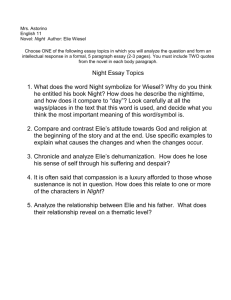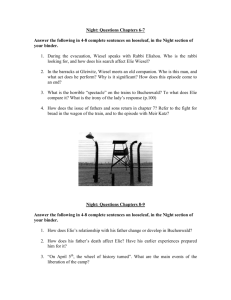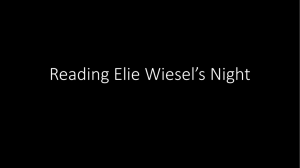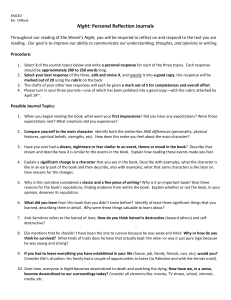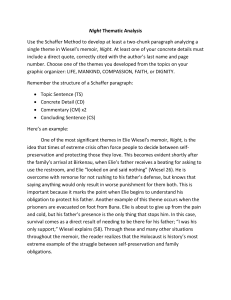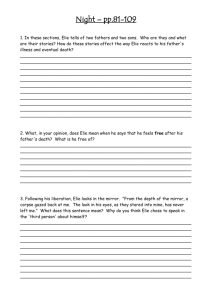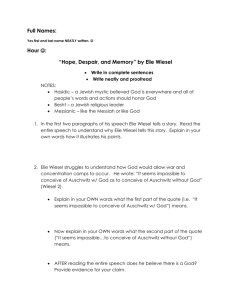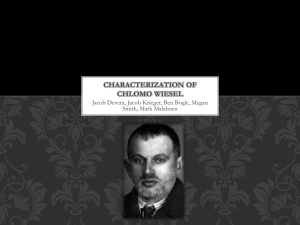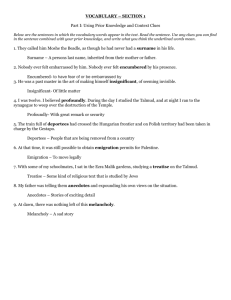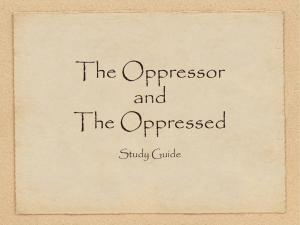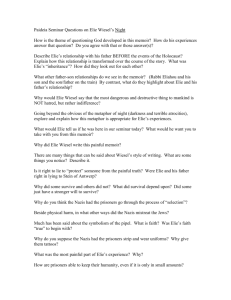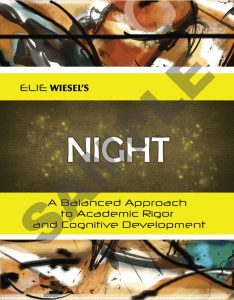English 2 Honors 2015 Summer Reading Assignment Mrs. Waters
advertisement
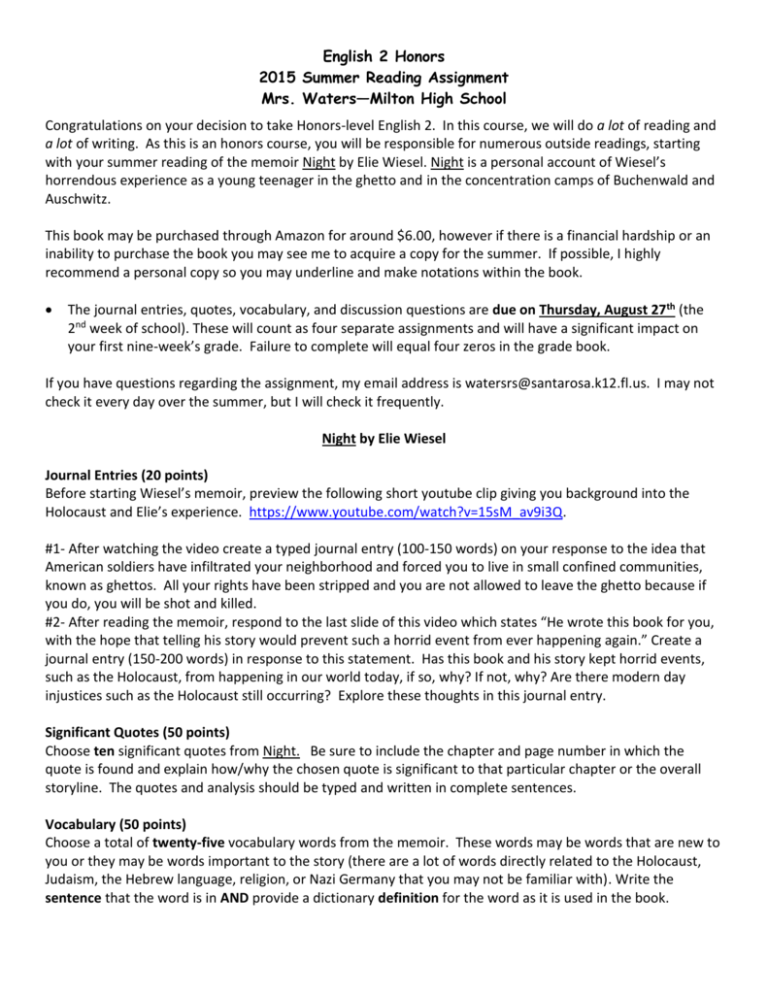
English 2 Honors 2015 Summer Reading Assignment Mrs. Waters—Milton High School Congratulations on your decision to take Honors-level English 2. In this course, we will do a lot of reading and a lot of writing. As this is an honors course, you will be responsible for numerous outside readings, starting with your summer reading of the memoir Night by Elie Wiesel. Night is a personal account of Wiesel’s horrendous experience as a young teenager in the ghetto and in the concentration camps of Buchenwald and Auschwitz. This book may be purchased through Amazon for around $6.00, however if there is a financial hardship or an inability to purchase the book you may see me to acquire a copy for the summer. If possible, I highly recommend a personal copy so you may underline and make notations within the book. The journal entries, quotes, vocabulary, and discussion questions are due on Thursday, August 27th (the 2nd week of school). These will count as four separate assignments and will have a significant impact on your first nine-week’s grade. Failure to complete will equal four zeros in the grade book. If you have questions regarding the assignment, my email address is watersrs@santarosa.k12.fl.us. I may not check it every day over the summer, but I will check it frequently. Night by Elie Wiesel Journal Entries (20 points) Before starting Wiesel’s memoir, preview the following short youtube clip giving you background into the Holocaust and Elie’s experience. https://www.youtube.com/watch?v=15sM_av9i3Q. #1- After watching the video create a typed journal entry (100-150 words) on your response to the idea that American soldiers have infiltrated your neighborhood and forced you to live in small confined communities, known as ghettos. All your rights have been stripped and you are not allowed to leave the ghetto because if you do, you will be shot and killed. #2- After reading the memoir, respond to the last slide of this video which states “He wrote this book for you, with the hope that telling his story would prevent such a horrid event from ever happening again.” Create a journal entry (150-200 words) in response to this statement. Has this book and his story kept horrid events, such as the Holocaust, from happening in our world today, if so, why? If not, why? Are there modern day injustices such as the Holocaust still occurring? Explore these thoughts in this journal entry. Significant Quotes (50 points) Choose ten significant quotes from Night. Be sure to include the chapter and page number in which the quote is found and explain how/why the chosen quote is significant to that particular chapter or the overall storyline. The quotes and analysis should be typed and written in complete sentences. Vocabulary (50 points) Choose a total of twenty-five vocabulary words from the memoir. These words may be words that are new to you or they may be words important to the story (there are a lot of words directly related to the Holocaust, Judaism, the Hebrew language, religion, or Nazi Germany that you may not be familiar with). Write the sentence that the word is in AND provide a dictionary definition for the word as it is used in the book. Discussion Questions (50 points) Choose any five of the questions below to answer. I am looking for you to demonstrate some ability to think about what you’ve read and to communicate those thoughts in writing. Please use complete sentences, and strive to craft a paragraph that answers all aspects of the question within it. Make sure you use text evidence to support your answers. When there is more than one question included, the order you respond to them doesn’t matter to me so long as you cover all the bases. Each question is worth 10 points, and you may receive only partial credit for brief or incomplete answers. Make sure the question number you are answering is clearly marked, and, if possible, please type your answers. 1. When Moshe tells Elie that he has “come to tell the story of his death” what changes have occurred in Moshe’s character since the beginning of the novel? 2. What images and thoughts from that first night at the concentration camp can Elie never forget? 3. The hanging of the pipel is an important turning point in the novel both in terms of the effect the hanging has on the prisoners and on the overall ideas that the pipel represents. Explain these effects in greater detail. 4. What is ironic in the statement, “I’ve got more faith in Hitler than in anyone else. He’s the only one who’s kept his promises, all his promises, to the Jewish people”? What other examples are there of irony in the novel? 5. Explain the relationship between Elie and his father. Note the changes in their relationship as they endure the harshness of the camps. Use text evidence to support your answer. 6. Many have commented on the savagery shown by the Nazis in a supposed modern and civilized world. Juliek’s violin represents cultured civilization amidst the brutality of the camps. Comment on how the Nazis could justify their actions toward the Jewish people. 7. How is the passage describing the fight over the piece of bread in the open cattle car one of both horror and sadness? 8. How does Elie change over the course of the novel? Use text evidence to support your answer. 9. McAfee Brown says, “It must be the prayer of our generation that with his (Elie Wiesel’s) help we can recapture enough of that reality so it will never be repeated.” Do you believe that the atrocities of the Holocaust will be repeated someday? Do you believe this novel can have that powerful of an impact? Explain your answer. 10. What are the various images and thoughts associated with the word “night” and why do you think Wiesel chose this word for the title of his novel? 11. Give examples of the ways in which similes and metaphors are used and the overall effect their use has on the writing itself. 12. One of the themes in the novel is faith. How does Akiba Drumer’s personal faith in God and in himself change? How does Elie’s faith in God and himself change? Why does one choose to die and the other to live?
